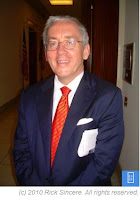Publisher's note: This article was originally published on Examiner.com on April 28, 2010. The Examiner.com publishing platform was discontinued July 1, 2016, and its web site went dark on or about July 10, 2016. I am republishing this piece in an effort to preserve it and all my other contributions to Examiner.com since April 6, 2010. It is reposted here without most of the internal links that were in the original.
A look back at efforts to put the brakes on government growth since 1980
April 28, 2010 3:13 PM MST
John Samples is the director of the Center for Representative Government at the Cato Institute in Washington, D.C. He is also the author of a new book published this month called The Struggle to Limit Government: A Modern Political History.
Samples spoke about his book at a Cato briefing on Capitol Hill on Wednesday, April 28, on a panel with Representative F. James Sensenbrenner (R-Wisconsin), the former chairman of the House Judiciary Committee.
After the panel discussion – which was recorded by C-SPAN for future broadcast – ended, Samples responded to a few brief questions from the Charlottesville Libertarian Examiner.
Limiting Government
Summing up his book, Samples said that it “looks at the effort to limit the federal government and, in some ways, to roll it back, after 1980. To understand what happened in that period, I look back to the 1930s and forward to the 2006 election.
“It’s really the story,” he said, “of trying to bring about some limits on the federal government, how it succeeded, how it failed, and why.”
During the Capitol Hill briefing, Samples mentioned the Tea Party movement and the effect it might – or might not – have on politics and elections. Are the roots of the Tea Party movement libertarian? Yes and no, Samples explained.
Spontaneous Tea Parties
Any kind of spontaneous movement in the way the Tea Party has been, he said, “is going to have a number of different people with a number of different views.”
However, he added, “because it arose specifically in response to an expansion of the federal government in the summer of 2009 … I think the core of this movement is a great dissatisfaction with that basic change – a big change – in the scope of American government.”
In other words, although various issues might be brought up at any given Tea Party gathering, Samples said, “the core is basically a concern about what’s going to happen in the United States with a large federal government.”
Comparing the election year of 2010 with the two years he examines in his book, 1980 and 1994, Samples found both similarities and differences.
1980, 1994, 2010
“In 1994 the economy was not too bad. In 1980 the whole modern movement came to power in the person of Ronald Reagan, because the 1970s had been very poor economically.”
That suggests, he said, because we’ve had rough economic times since late 2007 or early 2008, “that we’re in a similar period and that sooner or later we may see a strong revival” in which “America goes back to its roots, in many ways, and one of its roots is a kind of limited government,” particularly with regard to the economy.
So I think all things considered, we may be something like that now – more like 1980 than ’94.
One difference with 1994, he added, was that that year also manifested itself in “a crisis of governing. You had a lot of corruption. A surprising number of Members of Congress had either been thrown out or were under investigation.”
Moreover, Samples said, “you also had a sense in ’94 that this dominant majority that had been in power for 40 years was so entrenched that you couldn’t actually vote them out.”
That, he said, contrasts with 2010:
“I think that doesn’t exist now. We may see huge swings in House membership in 2006, 2008, and again in 2010.” The electorate, he said, “can really make a difference in a way that they were frustrated in ’92 and 1990.”
Trifecta
Regardless of what happens in 2010, however, Congressman Sensenbrenner warned at the beginning of the panel discussion that in order to put the brakes on spending, “we are going to have to dance the dance again,” and that will require a “trifecta in 2012” – that is, an election that results in Republican control of the White House, the Senate, and the House of Representatives.


No comments:
Post a Comment